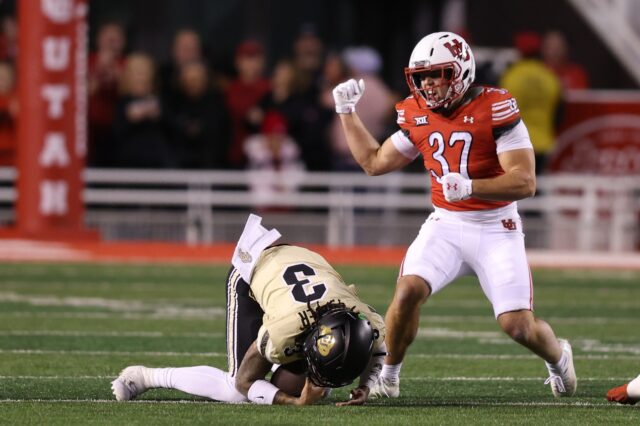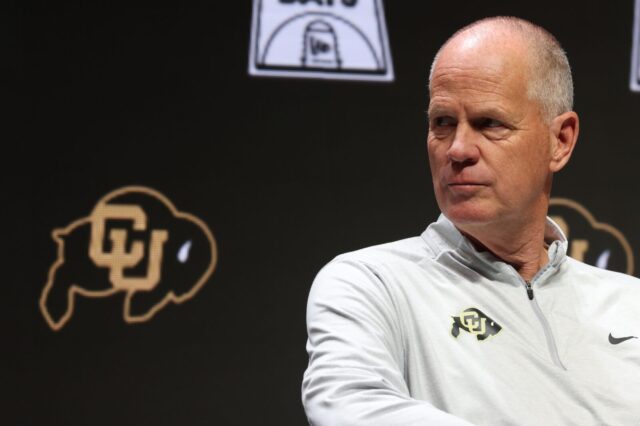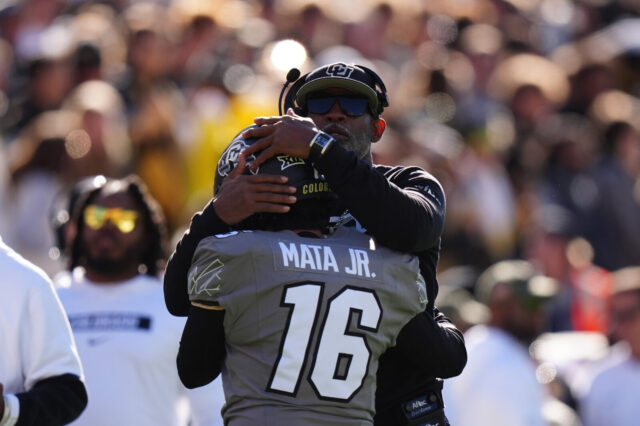This story originally appeared in Mile High Sports Magazine. Read the full digital edition.
Gloves lifted and mouthpiece in, Nate Engesser circles his opponent.
Outside the ropes, trainer and retired professional boxer DaVarryl Williamson calls combinations. Jab-jab-cross. Jab-cross-hook. For five rounds, Engesser complies with everything Williamson commands.
Engesser has long been a gym rat, but he never expected to trade in the hardwood for a boxing ring. That is, until University of Denver men’s basketball coach Joe Scott suggested that it might force the senior guard to develop more toughness.
“Coming here, I never would have thought I’d be taking a boxing class before my senior year, but Coach challenged me, and I took it in stride and went with it. I think it helped,” says Engesser, DU’s top returning scorer with 10.1 points per game last season. “It challenged me to be in shape and be physical. It taught me how to be in the fight and win that fight, like each possession on the court. That was a new experience for me. I enjoyed it.”
Engesser entered DU three years ago after shattering nearly every offensive record at Colorado Springs Christian School, a high school of about 350 students. There was little doubt that Engesser’s sweet shooting stroke would translate from Colorado 3A ball to Division I. But the rail-thin, 6-foot-3 guard underestimated the physical demands of college basketball, and his tentative, silent manner limited his court presence as a freshman.
“I was confident coming out of high school. I went to a smaller high school, and I was one of the leaders on the team since my sophomore year. I think I got a culture shock [when I got to Denver],” says Engesser. “It was a shock coming in, learning how physical the game is. I knew I could do the offensive things: dribble, pass, shoot. But the physical nature of it, getting plowed over by bigger guys and not being able to defend anyone, that was a big difference and a big change.”
While his confidence and performance have improved, Engesser continued to struggle in becoming the player he wants to be, especially on the defensive end.
“Every guy has weaknesses, and that’s okay,” Scott says, when asked about Engesser’s improvement on defense. “The way we need to overcome those weaknesses is by [playing unselfishly and having the seniors] opening their mouths. That will show up in how much better we are playing defense collectively. It’s not that Nate is playing better defense, it’s that we are playing better defense.”
Trying to figure out a solution, Scott turned to new assistant coach Dan Ficke, who mentioned a boxing class he had taken with Williamson one summer during his playing career at Loyola (Md.) University.
At first, Engesser questioned why a basketball player should be taking boxing lessons, but soon after he began twice weekly classes that focused on discipline, focus and toughness, not to mention speedy footwork that could prove extremely beneficial on the hardwood.
“One of my weaknesses over the years has been as a defender and trying not to be a liability on the defensive end. That different way of thinking, that fighter’s mentality, is what I’ve been trying to work on the most,” explains Engesser. “I know [the coaches] have confidence in me on the offensive side of the ball. I know I can do things that maybe other guys can’t. I don’t want to get too cocky, but having a focus and mentality of being a fighter on the defensive end is going to translate to helping the guys even more on the offensive side. That’s been my biggest focus: Being physical with my body and how I communicate.”
The Pioneers are going to need that fighter’s mentality from every player, especially seniors Engesser, Marcus Byrd and Bryant Rucker, if they hope to bounce back from an embarrassing 12-18 season a year ago.
“You’ve got to take on the responsibility to be a senior and what that really means. It means you know it’s not about ‘I can do this, and I can do that.’ It’s about how do we make the team better,” Scott says. “I know [the seniors] can do that. The problem is that there hasn’t been much practice with it over the last few years. There hasn’t been enough leadership. That falls on me, and that’s why we’ve made changes. That’s why we’re really young, because to affect this change we have to go really young.”
Denver lost its top two scorers from last season, Brett Olson and Cam Griffin, to graduation, along with three-year starter Jalen Love and Cam Delaney, who transferred to Division II Newman (Kan.) University and Sam Houston State, respectively.
That left a very young squad with 12 underclassmen on the 16-man roster. It also means that the mantle of leadership falls to three seniors who are more Beaver Cleaver than Vince McMahon.
Scott is looking for Byrd, Engesser and Rucker to move beyond their polite quietness and provide what he’s termed “positive peer pressure” in order to help the freshmen and sophomores develop.
“They need to come out here every day and have that confidence to know, ‘I’m a senior.’ You know what seniors do? They care about the team, and they open their mouths and loudly say, ‘This is what we have to do,’” Scott says. “They lead by doing it. And by saying, ‘We.’ And they have to do it every day. There has to be consistency. Then you’ll find these freshmen coming along and playing well.”
Youth movements are nothing new at DU under Scott. Twice in Scott’s previous eight seasons at Denver, the Pioneers have ranked among the 10 youngest teams in the nation, a distinction that Scott expects to hold again this year.
“As of right now, I’m playing four [freshmen], because they’re good, and we’ve got to throw them in there and make them grow up,” says Scott. “Young teams have ups and downs … The more the seniors [focus on playing as a team], the more our sophomore centers develop and help the team, the more I know our freshmen are going to be good and grow up quicker. When is it going to happen? I don’t know. I do know the pieces are there for it to happen, but I’m not concerned with when. I’m worried about getting better every day and us concerning ourselves with what we’re talking about, because then we’ll get better.”
The biggest difference between this season and Denver’s two previous youth movements is that the Pioneers then looked to obvious, vocal senior leaders each time, including Chase Hallam who helped lead DU to 22 wins, a WAC regular season title and an NIT appearance when these seniors were freshmen.
Vocal leadership does not come as naturally to this year’s senior trio.
“I’m a quiet guy, and Ruck’s a quiet guy. Byrd’s doing a good job of being the vocal leader, but it’s got to come from all three of us. Being on the court, you have to come out of your shell as a quiet person but not get too far away from who you are,” Engesser says. “I’ve always been more of a quiet guy. I think Coach has challenged me over the years to be louder and more talkative and communicate the right way, and I totally agree. I know I’ve gotten better at that. But if I can lead by doing things right every time, and being in shape is obviously a big thing with Coach. Coach talks about positive peer pressure. If I’m on the guy or I’m running or I’m doing these things, that’s my way of leading by example.”
Scott is quick to point out that while he hopes Engesser, Byrd and Rucker grow into stronger leaders, he does not expect their personalities to change completely.
“They just need to be seniors. They don’t need to [do too much],” says Scott. “I need to be able to count on them to do what we do and do it really well. There’s no ‘I’ about it. It’s just ‘we, us and our.’ If our seniors come out every day and do that, I know they’re going to help us. That’s been our problem over [recent seasons]. We haven’t had ‘we, us, our.’ We haven’t had, ‘We do what we do, and that’s what we care about.’ We’re getting back to that.”
Byrd was part of back-to-back, 22-win seasons during his redshirt and freshman years; as a fifth-year senior, he is the most likely to open his mouth in practice and during games. He also refuses to shy away from last season’s results or make excuses for it.
“We’re looking to bounce back from last year. We honestly did horrible last year. We lost games that we should have won,” says Byrd, a product of Highlands Ranch High School. “Getting players to do what they’re coached to do all of the time, that’s the main goal. That will help us out, because if we get people doing what they’re supposed to do all the time then, yeah, we could get back to 22 wins. It’s possible. That’s the goal.
“Last year, there were too many things on people’s minds. It wasn’t really focused on strictly basketball. This year Nate, Bryant and I have really stepped up and taken the role in pushing guys. This year we need to focus on basketball, because last year it obviously didn’t work out. It’s basketball and school, basketball and school, basketball and school. That’s going to be the main focus. This year, I think everyone is on board because they realize that the results we got last year were not as ideal as they should have been.”
That is good news for Scott, whom Denver hired from Princeton in 2007 with expectations that he would lead the Pioneers to the NCAA Tournament for the first time in school history.
However, since those consecutive 22-win seasons, the Pioneers regressed the last two years, combining for a disappointing 28-33 mark. While those performances would land some college coaches squarely on the hot seat, Scott is under contract through 2017-18 and seems less concerned with any mounting pressure than in changing the culture of his young team.
“All of these things go together. [Byrd, Engesser and Rucker] are the last guys that were part of really good years here,” Scott says. “They were really good years because they had [leaders who focused on team success]. That sort of leadership wasn’t there for them [since then]. That might be the reason. You grow out of your shell because you have so much confidence in the ‘we.’ Because you know you’re part of the group. You stand up for the group. You come out of your shell when you’re not thinking about yourself. The more you think about yourself, the more you stay in your shell and keep your mouth shut and not yell, ‘This is what we’ve got to do.’ When you say ‘we,’ you can raise your voice. That’s really what I’m looking for from those guys. That’s what I’ve talked to them about. That’s what I want to see from them. I don’t care if they make a shot. I care if they’re doing this. I care if I can hear their voices clearly saying, ‘This is what we need to do.’ That’s when I know the shot will go in.”
All three seniors have had glimpses of brilliance in their careers, but consistency has been elusive. Instead of pressuring themselves, however, Byrd, Engesser and Rucker have heeded their coach’s guidance, focusing their efforts on helping the underclassmen.
In doing so, Byrd’s career is coming full circle during his fifth year. Redshirting as a freshman, Byrd embraced a role on the scout team, focused on helping his teammates prepare by running opponents’ offenses. As the elder member of this year’s team – “I’ve gotten the nickname from some of the guys: Father Time. That, or Old Man Byrd. I’ll take it,” he says – Byrd knows his biggest impact can be sharing his experience and wisdom.
“I’m a senior, so Coach expects a lot more from me. He really shouldn’t have to coach me about what to do. It’s my job to tell the freshmen, ‘We’ve got to do it this way. It works this way,’” says Byrd, who tallied 8.5 points and 3.7 rebounds last season. “It really has come full circle. It’s gone from helping [the regulars] with other aspects to now where I know [our system], and I’m teaching them how to do it. I’m teaching them, ‘If you do it this way, it might be a little more efficient,’ giving them little pointers.”
Although an inexperienced team comes with lowered expectations – DU has been picked at or near the bottom of the Summit League by national publications – Denver could benefit from a soft schedule. Wyoming and Eastern Washington are the only 2015 NCAA Tournament teams on DU’s nonconference schedule. The remaining 11 teams on the nonconference schedule went 143-196 (.422) in 2014-15, and none of them had a winning record.
That should help the Pioneers in the early going, and if the seniors develop the fighter’s mentality and can teach the underclassmen how to play together in DU’s version of the Princeton offense, the Pioneers just might have the potential to silently sneak up on teams and shatter those expectations.
In the Summit League, which has not sent an at-large team to the NCAA Tournament since 1991, a conference tournament title is almost certainly the only way Denver could earn that elusive first trip to the Big Dance.
Scott and company are well aware of that fact, but their focus is on the process, not the endgame.
“We’ve got to be one of the 10 youngest teams in the country. Twelve out of 16 are freshmen and sophomores, and the bulk of them are freshmen,” Scott says. “But that’s a good thing. I’m really excited. We’ve got all of their attention in the right way. We’ve got some good young players. It’s just a matter of how quick it all comes together, how quick they grow up and make sure we’re getting better every day, improving every day. That’s the theme: How quick do we grow up, and how consistent are we at getting better everyday? Because if we get better every day, then we’ll become a pretty good team.”



